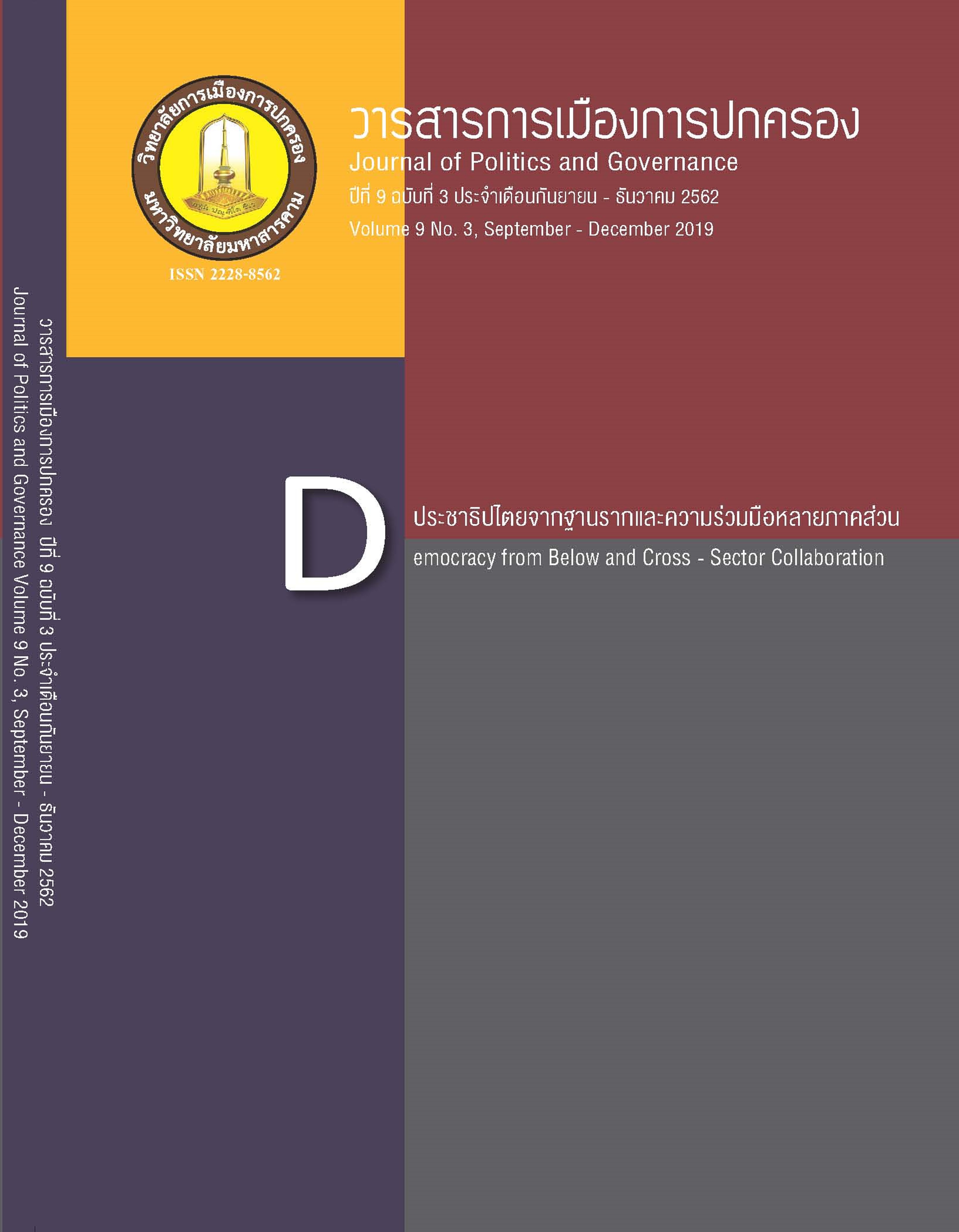The Impact of the Development of Special Border Economic Zone on the Well - Being of Residents Residing in the Area: A Case Study of Dontan, Mukdahan, Thailand
Main Article Content
Abstract
The purposes of this study are 1) To investigate the possible impacts influencing on the residents in the Special Border Economic Zone (SBEZ), Dontan, Mukdahan, Thailand 2) to examine the problems that may arise from the policy of committees of the SBEZ, Dontan, Mukdahan, Thailand 3) to provide suggestions and recommendations on how to develop the well beings of the residents in the area of SBEZ, Dontan, Mukdahan, Thailand. This study was carried the mix methods which used both quantitative and qualitative approaches. For a quantitative research method, the survey questionnaire was used as a tool for collecting data from three hundred and eighty-two stakeholders, residents of the SBEZ. Descriptive statistics and Spearman’s Correlation have been applied to analyze the data whilst the percentage and levels of significances at 95 percent. In addition, for qualitative research method, the semi-structured, in-depth interview was applied as a tool for attaining data from three key - informants, and local administrators. The findings indicate that 1) The majority of the key informants agree that the implementation of the SBEZ’s development policies have an impact on the technological, sociological, economic, and political factors suggesting 86.910, 83.769, 80.890, and 80.104 per cent respectively. 2) The majority of the key - informants states that there is a low level of knowledge and understanding related to approaches of the SBEZ’s committees for the development within the SBEZ. 3) The Local administrators should promote the occupations to comply with the labor market needs, and also support the eco - tourism to increase the income of local people, as well as promoting and exchanging to inherit the goodness culture of the people living in the Special Economic Zone Dontan Mukdahan province.
Article Details
References
ยุทธศาสตร์การพัฒนาเขตเศรษฐกิจพิเศษ จังหวัดกาญจนบุรี. Journal of Thai Interdisciplinary Research, 10(2), 8-15.
ดิเรก ฟั่นเขียว. (2559) .ข้อเสนอเพื่อการพัฒนาในพื้นที่เขตเศรษฐกิจพิเศษชายแดนจังหวัดตาก.วารสารด้านการบริหารรัฐกิจและการเมือง, 5(1), 1-3.
บุหงา ศรีรัตนภมร, พรนภา เตียสุธิกุล, &วิมล หอมยิ่ง. (2559). ความเป็นไปได้ของนโยบายการจัดตั้งเขตเศรษฐกิจพิเศษแห่งแรกของประเทศไทย จังหวัดตาก. วารสารบัณฑิตศึกษามหาวิทยาลัย ราชภัฏวไลยอลงกรณ์ในพระบรมราชูปถัมภ์, 10(1), 167-178.
ประสงค์ โพธิ์สุวรรณ์. (2558). พัฒนาการความร่วมมือทางเศรษฐกิจระหว่างไทย-เมียนมาร์:เขตเศรษฐกิจพิเศษท่าเรือนํ้าลึกทวาย. ปริญญาปรัชญาดุษฎีบัณฑิต (การเมือง) มหาวิทยาลัยรามคำแหง, 4-7.
ศูนย์บริการเบ็ดเสร็จด้านการลงทุนจังหวัดมุกดาหาร. (2558). เขตพัฒนาเศรษฐกิจพิเศษจังหวัดมุกดาหาร“ศูนย์ค้าส่งและการขนส่งต่อเนื่องหลายรูปแบบ. ค้นเมื่อ 10 มิถุนายน 2560. สืบค้นจาก http://www.mukoss.go.th/oss/muk.php
สำนักงานคณะกรรมการพัฒนาการเศรษฐกิจและสังคมแห่งชาติ. (2559). แผนพัฒนาเศรษฐกิจและสังคมแห่งชาติฉบับที่ 12 พ.ศ. 2560 – 2564. ค้นเมื่อ 10 มีนาคม 2560. สืบค้นจาก http://nesdb.go.th
สำนักงานปลัดกระทรวงศึกษาธิการ. (2559). แผนพัฒนาการศึกษาของกระทรวงศึกษาธิการ ฉบับที่ 12 (พ.ศ. 2560 - 2564). ค้นเมื่อ 15 มีนาคม 2560. สืบค้นจาก http://www.moe.go.th/moe/th/news/detail.php?NewsID=47194&Key=news20
สำนักงานจังหวัดมุกดาหาร. (2557). แผนพัฒนาจังหวัด 4 ปี (พ.ศ. 2557 – 2560). ค้นเมื่อ 15 มีนาคม 2560. สืบค้นจาก http://www.mukdahan.go.th/sta_prov.php
สำนักงานคณะกรรมการส่งเสริมการลงทุน. (2010). เขตเศรษฐกิจพิเศษและเขตการค้า เขตเศรษฐกิจพิเศษสะหวัน-เซโน (Savan Sano Special Economic Zone). ค้นเมื่อ 8 มิถุนายน 2560. สืบค้นจาก http://www.boi.go.th/thai/clmv/Black_up/2010 _laos_5_8.html
ไอรดา วางกลอน, พรพินันท์ ยี่รงค์. (2559). แนวทางการพัฒนาโครงสร้างพื้นฐานสู่การพัฒนาเขตเศรษฐกิจพิเศษชายแดนจังหวัดเชียงราย. สำนักงานเศรษฐกิจและโลจิสติกส์: มหาวิทยาลัยแม่ฟ้าหลวง, 10, 26
AhamaSama-air & Husain Mhadmarn. (2017). ความเห็นของผู้นำชุมชนต่อการพัฒนเศรษฐกิจของรัฐในสามจังหวัดชายแดนภาคใต้. วารสารอัล-นูร บัณฑิตวิทยาลัย มหาวิทยาลัยฟาฏอนี, 11(20), 151-164.
Kadam, Dr. Ravi. (2012). A Big Bang of Special Economic Zones (SEZs) on Indian Economy, Issues and Facts.IJRFM, 2(7).
Wang, J. (2013). The economic impact of special economic zones: Evidence from Chinese municipalities. Journal of development economics, 101, 133-147.


